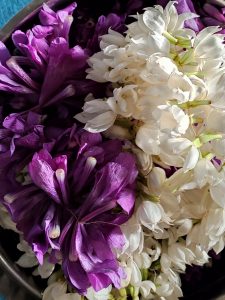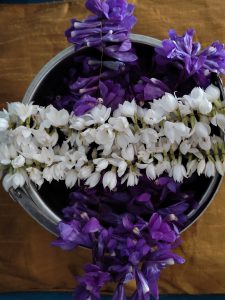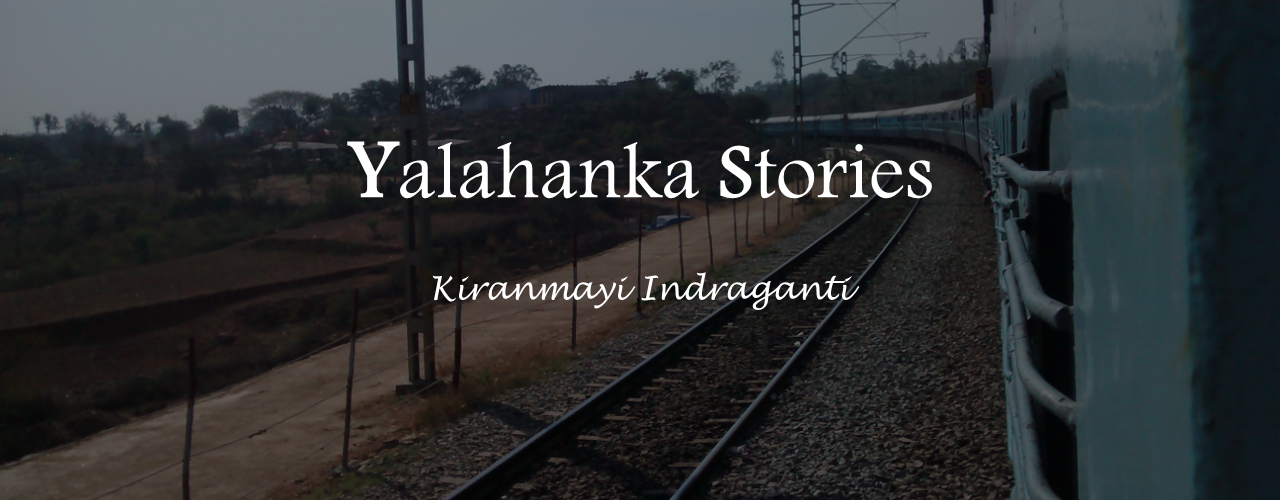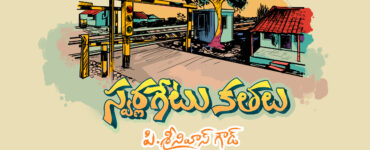All gods in Indian mythology are either fair or dark. And they are related to each other. One god is an uncle of another, and a goddess the mother or mother-in-law of this or that god; it is a huge family up there in heaven. They are beautifully described in various texts. Shiva, the god of destruction, is a man of fair complexion except for his throat where he holds the venom of the world. His wife Parvati is a dark woman of great beauty. Vishnu, the god of sustenance, is dark and his charm knows no bounds whatever incarnation he takes. His wife Lakshmi is fair and stunningly beautiful, like Parvati in her darkness. The list can go on. As if to make a point to the modern day expatriates, the mythical marriages have been inevitably inter-racial. No wonder we are brown people.
Nanda woke up as if hit by a bolt. It was strange. In her 25 years of life, she had hardly performed a pooja, but why did she dream about gods and deities? Wasn’t she explaining Gauri pooja to someone? But who was she talking to?
Some man. Didn’t look like an Indian. God!
***
 The previous night, there was plenty of talk about Sarala’s forthcoming wedding and the arrangements one needed to make in a span of two months. Where would you book a marriage hall in Yelahanka? Nanda’s 58-year-old mother, Kasturi was worried about the little space they were left with now that the house was ceded to Aunt Syama and family. Kasturi would walk into her daughter’s room whispering this and that, visibly not happy with her own decision. But the family needed their support, and Kasturi was known for her egalitarian spirit. The house was quite spacious with four bed rooms and a decent hall in 2200-square-feet. When Kasturi and her husband, Hari, bought it, they were sure of what they wanted; two huge shelves for books fitted to the wall, cupboards of teak and plywood doors fitted with locks, a huge loft above a couple of rooms to store old brass cookware, and a few strategic nooks and corners for other utilities.
The previous night, there was plenty of talk about Sarala’s forthcoming wedding and the arrangements one needed to make in a span of two months. Where would you book a marriage hall in Yelahanka? Nanda’s 58-year-old mother, Kasturi was worried about the little space they were left with now that the house was ceded to Aunt Syama and family. Kasturi would walk into her daughter’s room whispering this and that, visibly not happy with her own decision. But the family needed their support, and Kasturi was known for her egalitarian spirit. The house was quite spacious with four bed rooms and a decent hall in 2200-square-feet. When Kasturi and her husband, Hari, bought it, they were sure of what they wanted; two huge shelves for books fitted to the wall, cupboards of teak and plywood doors fitted with locks, a huge loft above a couple of rooms to store old brass cookware, and a few strategic nooks and corners for other utilities.
Kasturi loathed weddings and wedding-related stress. As a retired professor, she had been maintaining a certain decorum within the family, accepting an occasional invitation but maintaining a well-preserved disinterest in all affairs weddings. Nanda thought of her mother as a great observer of people, their misgivings about themselves and the others. She wore good sarees, a bit callously, Nanda thought.
Kasturi never put on make-up nor yielded to the lure of special looks for an occasion. She carried her mother’s peachy complexion, had thick eyebrows which she never cared to shape, and soft flowing black hair that she braided every morning and washed once a week. She was soft-natured, highly rational and a born diplomat.
Kasturi’s favourite pastime was to read novels from around the world. She had been a voracious reader both by need and interest, and her favourite was Mark Twain. ‘No one writes like him’ she concluded often. When she fell in love with her husband, Hari, a young writer and academic at the time, their common interest was literature. She read well, was unorthodox and rational, and he was attracted to her.
Hari was very dark. ‘They are pitch black,’ Syama, Sarala’s mother, a fair woman herself, jocularly threw a jibe. She married Hari’s brother, who was ‘no better in complexion.’ Hari loved to read Pushkin. He read the whole day without a hint of fatigue. And he read many books in different languages, including English and Sanskrit. Kasturi read in English, and sometimes, works of interest in translation. She voted for the Communists. Hari never liked them. ‘I don’t trust them. They speak of a classless society, but they are the most casteist and class-conscious people. Russia’s only saving grace is its writers. Thank god for that!’ he would say to make Kasturi frown. She would quietly go out and vote for the mazdurs. The communist that she was, she liked Mark Twain, the liberal that he was, he loved Pushkin. The household was divided between the Russians and Americans. Some paradoxical drift there.
When Sarala’s marriage was fixed, Aunt Syama came home to vent her frustration about finding a boy for her dark girl. ‘I don’t know how Sunanda is going to fare in the marriage market, Kasturi!’ she curled her lower lip in dismay. Kasturi was visibly annoyed that their conversation should wheel towards Nanda. ‘Oh don’t worry. She is capable of finding a man for herself. We don’t have to send around horoscopes,’ she affirmed. That stopped Syama from going into the genealogies of looks. Syama received a hot cup of filter coffee with home-made sweet and savoury snacks. She sat there the whole afternoon deliberating over the number of pairs of clothes that they needed to buy for the girl, the boy, the elders and the guests.
***
Nanda woke up with a series of memories of small conversations and big ideologies swirling in her head. By the time she got ready to leave for university, Sarala was in the hall, a quiet girl that she always had been, in a state of unknown anticipation. Nanda smiled at her, greeted her father and quickly glanced around. There were familiar faces, often witnessed at family affairs. She gulped a bit of air, waved to them affectionately, and left home.
The Ganesha festival had just ended. People had thronged the bazaars for two days, like small coins running out of a hand purse that’s forgotten to be fastened. They bought sparkly idols, worshipped them, offered sweetmeats, and finally immersed them in the waters of lakes around Yelahanka, on the third or ninth day. Nanda watched the clay ones slowly disfigure absorbing the water.
When the wedding was scheduled to take place in the month of Kartika, the details of food came up as did the complexion of girls for sarees and presents. Nanda’s fair cousins and dark cousins plotted two types of caterers, those serving the mild Kannadiga food and those that brought a spicier Andhra food.
On the night of the wedding, Kasturi’s close friends visited her in rustling silks and gleaming smiles, happy that their friend invited them for an occasion that required more than a khadi outfit. Kasturi pretended to have fun with them, but Nanda sensed that she was unhappy with the way the mango tree was cut for leaves and lighting arrangements and the number of times the electric connection tripped. She was vexed about being asked for small change to add to the betel leaf gift combos. She changed the door mats smeared with turmeric, changed the curtains for generous rubbing of palms of dried henna, grease and colour. She changed the clothes-line when it had broken down under heavy blankets. She fed the cats in a corner, chided them for making noise! Mother, dear o mother, Nanda sighed.
Aunt Syama was in tears at the end of it all, convinced that the wedding went beautifully and perfectly.
“It wouldn’t have been possible without your help, Kastu!” she choked. “Sarala is a married girl now,” she waved her hands ruefully. Kasturi quietly absorbed her words. Aunt Syama continued: “the first priest, the dark one, conducted all poojas well. Some grace there! The other one, the fairer brahmin had his mind somewhere else. His chants were not correctly pronounced, some said. Did you notice?” Mother nodded in the negative. “Not that I’m an expert! I never followed them anyway,” she declared. Syama kept quiet.
Right outside the house, the long-stemmed naga malli flowers kept falling on the grass. Their fragrance filled the veranda. “I’m sure my daughter’s wedding will help you plan for Nanda’s as well. Are you looking for boys?” Kasturi nodded in the negative. “Let me know if you need any help,” she whispered. Kasturi lavished her most diplomatic smile on her sister-in-law.
Nanda closed her eyes. Who would she marry? A dark man or a fair man? A good one or a miserly one? One who respects her or beats her? Some gumption gripped her:
“I may marry a foreigner, peddamma !” she said. Syama was shocked. “The cheek!
Yeah, yeah… bring some foreigners to Yelahanka and we shall get you married,” she taunted.
***
Much water had flowed under the bridge now.
I met Nanda’s little boy on the lawns—a white-brown boy, from her marriage to James, who spoke a handful of languages.
Sarala often visited Nanda during her struggles with PhD, a lovely dusky boy tugging along with her. The boy’s grandparents were happy that he took to Sanskrit and not American English or Russian!
Nanda’s boy liked Japanese manga. Each evening, Nanda gently tended to her dusky skin for which James had exclusive praise.
Over the recent years, he had learned to immerse the clay Ganesha in running waters, explaining to his little boy the exploits of Shiva and Ganesha.
Many mango trees were trimmed every year and many naga malli flowers bloomed and fell to ground as quietly as dropping a savings deposit slip into the universe’s account.
And weddings took place for people of fair and dark skin as clamorously as ever, the landscape of the city changing its complexion ever so often.
***









Excellent story with wonderful narration. Very nice👌👌👌
Thank you. Very kind of you.
True. This story has been written in simple style, probably reflecting Kasturi’s elegant and rational character with quiet distrust of cumbersome complex traditions; and yet she compromises on a social plane. She is the pictire of liberalism and implements the value she lives: Live and let live. Previous stories of Ms Kiranmayi are poetic pieces, more or less. Here social realities and egalitarian sense dominate. Hence less ornamental style. Congratulations !
It’s a very well groomed garden of thoughts convincingly reared with a touch of orchestrised descriptions all falling in line with each other to align to the expanding social order.When the German takes to tradition the story had a true completion of circle.yeah…universe has more circles and spheres and coming backs .now, I shall preserve this story in my mail to taste it now and then for the sheer pleasure of re reading it.
Kudos Kiranmayi garu,your prose is also poetic.
Thank you very much! Very kind of you.
These comments are inspiring and am sure will put me on the right path to record my observations of life, its many experiences.
Thank you!